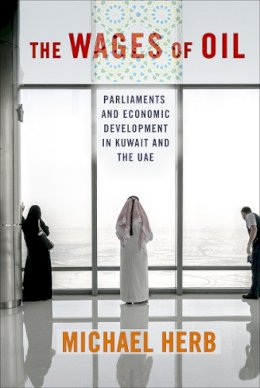
The Wages of Oil: Parliaments and Economic Development in Kuwait and the UAE
Michael Herb
The contrast between Kuwait and the UAE today illustrates the vastly different possible futures facing the smaller states of the Gulf. Dubai's rulers dream of creating a truly global business center, a megalopolis of many millions attracting immigrants in great waves from near and far. Kuwait, meanwhile, has the most spirited and influential parliament in any of the oil-rich Gulf monarchies.
In The Wages of Oil, Michael Herb provides a robust framework for thinking about the future of the Gulf monarchies. The Gulf has seen enormous changes in recent years, and more are to come. Herb explains the nature of the changes we are likely to see in the future. He starts by asking why Kuwait is far ahead of all other Gulf monarchies in terms of political liberalization, but behind all of them in its efforts to diversify its economy away from oil. He compares Kuwait with the United Arab Emirates, which lacks Kuwait's parliament but has moved ambitiously to diversify.
This data-rich book reflects the importance of both politics and economic development issues for decision-makers in the Gulf. Herb develops a political economy of the Gulf that ties together a variety of issues usually treated separately: Kuwait's National Assembly, Dubai's real estate boom, the paucity of citizen labor in the private sector, class divisions among citizens, the caste divide between citizens and noncitizens, and the politics of land.
Product Details
About Michael Herb
Reviews for The Wages of Oil: Parliaments and Economic Development in Kuwait and the UAE
Kristian Coates Ulrichsen
International Affairs
Herb provides a well-presented analysis of the political economies of the Gulf monarchies, with a detailed and insightful assessment of Kuwait and the UAE. This book is a welcome addition to scholarly work on the rentier economies of GCC (Gulf Cooperation Council) states.
Lorraine Charles
Middle East Journal
Michael Herb has written about very technical economic concepts using a plethora of graphs and advanced terminology to argue his points. The subject matter isn't for everyone; those with a background in economics and political science will appreciate the book more than others. Yet the book is lively and engaging and Herb has taken a potentially dreary subject and produced an intriguing book accessible to all.
Charles Fraker
Middle East Policy Council
[T]his book provides a convincing explanation of the origin and effects of Kuwait’s parliament, and suggests several important avenues for further exploration. It does so in sharp, enjoyable prose that is accessible to all educated audiences. For researchers, professors, and practitioners in the fields of political economy, oil and politics, and the Gulf monarchies, this text is useful, engaging, and highly recommended.
Jocelyn S. Mitchell
Arab Studies Journal
